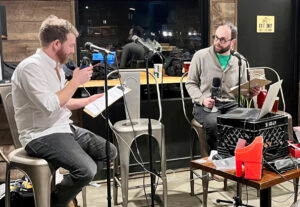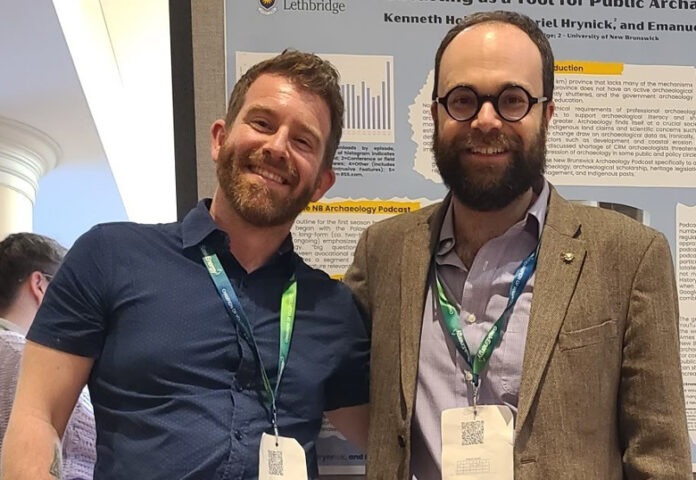An assistant professor at the University of Lethbridge (U of L) has received an award for his work on the microphone.
Dr. Ken Holyoke is an assistant professor in the U of L’s Department of Geography and Environment. Along with Dr. Gabriel Hrynick of the University of New Brunswick, Holyoke hosts the ‘New Brunswick Archaeology Podcast’ (NBAP).
The duo has been awarded the 2024 Public Communications Award from the Canadian Archaeological Association.
The podcast is wrapping up its second season and covers topics like gaps in public education relating to archaeology, archaeological scholarship, heritage legislation and Indigenous pasts.
“We were fully anticipating if we could reach 10 people, that’d be 10 more than we did before,” says Holyoke. “We sort of make fun of ourselves in saying that the reach of the podcast in the first season alone far exceeded the impact of any of our academic papers.”
Although the podcast is centred in New Brunswick, the production value has received a boost since its inception thanks to the work of U of L Digital Audio Arts student Emanuel Akel. He joined the production after the hosting duo received a U of L SSHRC Exchange grant to enhance their product while giving an undergraduate student a work-integrated learning opportunity.
In a joint article, Holyoke and Hrynick say archaeology is at a crucial point for public engagement.
“Pressing societal needs and legal decisions, including Indigenous land claims, increasingly draw on archaeological information,” they say.
“At the same time, threats to the archaeological record from climate change and development are increasing. In response to these concerns, public archaeology is increasingly necessary as it brings archaeological research to the general public.”
During their second season, the duo presented the podcast live in a New Brunswick tavern.
“Based on the feedback to the podcast via our email address, social media engagements and attendance at a recent live recording, there is considerable public interest in archaeology,” the hosting team notes.

“There are a bunch of people we’d like to interview for season three and we’re looking at focusing broadly on the theme of human-environment interactions,” Holyoke says.
“It’s turned into something we really enjoy doing and we want it to continue to grow, in part because there’s quite a bit of effort that goes into it now and we’d like to be able to reach more people.”
Episodes of the podcast are available here.







